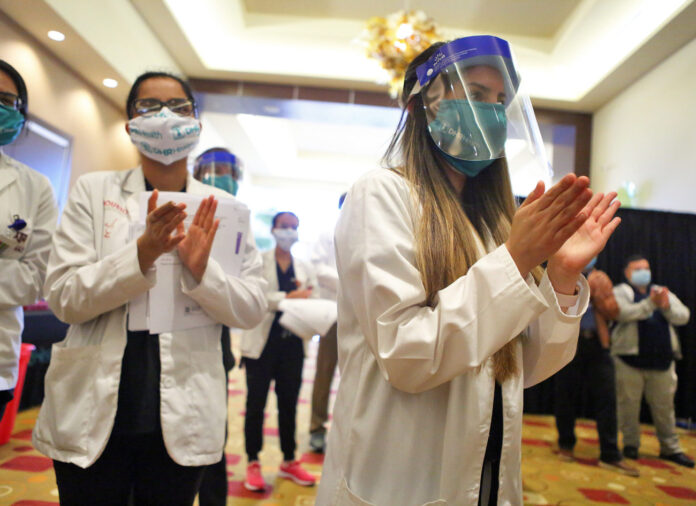
With the focus on health care growing stronger due to the COVID-19 pandemic, state legislators representing the Rio Grande Valley are hopeful that Medicaid expansion will have enough support among lawmakers this legislative session which is set to begin Tuesday.
State Rep. R.D. “Bobby” Guerra, D-McAllen, said he intended to file a bill that would expand the Medicaid program in the state under the Affordable Care Act. State Rep. Diego Bernal, D-San Antonio, already filed such a bill, H.B. 171, in November.
“We’re working on that as we speak,” said Guerra, who sits on the Texas House of Representative’s Public Health and State Affairs committees.
During his first legislative session in 2013, Guerra said lawmakers couldn’t even mention Medicaid expansion.
“At that time, the governor did not want to hear about expansion,” Guerra said. “It was made very clear that any bill that had even a mention of expansion would not get anywhere.”
But now, he believes the pandemic, which is responsible for nearly 30,000 deaths in the state, has opened the eyes of lawmakers, including those who perhaps didn’t support expanding the program in the past.
Additionally, Guerra argued that it made financial sense.
“Medicaid expansion would result, in Texas, in $5.4 billion in new federal dollars to Texas or nearly $110 million over the next biennial,” he said. “Now that’s a lot of money and because we have not expanded it, we’re giving up a lot of dollars.”
A study by the Bush School of Government & Public Service at Texas A&M University projected the state would receive $5.41 billion more in federal dollars through Medicaid expansion and about 954,000 of Texans would likely enroll out of the 1,274,000 who are estimated to be newly eligible under the program.
State Sen. Eddie Lucio Jr., D-Brownsville, said he fully supports expanding the program.

“That’s on the table and I hope that somehow, some way, we can get that job done,” Lucio said. “(Guerra) is on the right track in terms of trying to pass legislation to make that happen; I’m waiting to see what the chairman of the Health and Human Services committee in the Senate is going to do.”
“Hopefully we can get it done,” Lucio added. “I certainly would favor making it the law or putting it in statute.”
Lucio is chair of the state Senate committees for Intergovernmental Relations, vice chair of the Education and Finance committees. He also sits on the State Affairs committee and Veteran Affairs and Border Security committee.
So far, he’s filed at least three other bills related to public health including SB 114, which directs the Texas Department of State Health Services (DSHS) to establish a border public health multi-disciplinary response team to deploy in response to outbreaks, public health threats and disasters in the border counties.
Through SB 115, DSHS would be directed to conduct an assessment of capacity and resources of border laboratories, establish inter-local agreements for border laboratory resources and allow for year-round testing for border counties.
Additionally, through SB 116, DSHS would be directed to develop a public health initiative to reduce the adverse health impacts of diabetes, hypertension and obesity for adults and children in border counties through education, screening and prevention treatment.
“These bills are critical to strengthening our border public health and I look forward to working with out local health officials, as we have over the last couple of years, to address our region’s needs during the upcoming 2021 legislative session,” Lucio said.
“The Valley has unique health challenges — diabetes rates are high (and) the chance of contracting a severe case of COVID is much higher for those with pre-existing conditions such as diabetes,” Lucio continued. “For those who do not have access to or cannot afford to keep their diabetes under control, the effects are even worse. Therefore we need to help reduce cases of diabetes and ensure that those with diabetes have access to and can afford the drugs needed.”
“No one should have to die just because they can’t afford to live,” he added, “so this will not only save lives from COVID but will continue to save lives down the road.”
Guerra has also filed a handful of healthcare-related bills including HB 745, which would establish telehealth programs in public schools.
“We have a lot of, lot of people that live in District 41 that are involved in health care,” Guerra said referring to his state House district, “so we need to be sensitive to those issues and do the best we can to make sure that we are sensitive to what’s making things work and what’s making things not work.”
One of the things he believed did work was the implementation of telemonitoring and telehealth as a way of cutting healthcare costs.
With telemonitoring, specifically, Guerra said it would help cut out the need to send nurses or other healthcare providers into the community to take a patient’s vitals.
“When you talk about telehealth, it’s the same concept,” Guerra said. “A doctor can now use modern technology to talk to the patients without the patient necessarily having to come in to the office.”
“And especially now with this pandemic, that’s especially important,” he said. “Now, the physicians will also tell you that there’s … many situations where they actually need to see the patient, and that makes sense but to be able to visit with the patient by telehealth, I think, is extremely important and especially for our schools.”
In addition to HB 745, Guerra also introduced HB 784 which calls for DSHS to enter into an agreement with an institution of higher education located in Hidalgo or Cameron counties to increase the availability of lab services in border counties.
He also introduced HB 881 which would require DSHS to provide year-round laboratory support for arboviral testing of vector-borne infectious diseases in border counties.
Actually passing bills, though, might prove more difficult this year than in previous sessions as lawmakers are tasked with redistricting — the process of redrawing district boundaries every 10 years based on population — which Guerra said was one of their two constitutional duties that legislators have this year along with adopting the state budget.
“And given this pandemic, that’s going to be a huge undertaking because the state of Texas has taken a real hit, as many places have throughout the United States,” Guerra said. “We’ve got an estimated $4.6 billion deficit going into the session so we’ve got to be innovative and we’ve got to find ways to make sure that Texas continues to be ahead of the game and I think our colleagues in the House of Representatives and in the Senate are prepared to do that.”
For Lucio, though, health care remained the top priority and, faced with coping with the coronavirus pandemic, he believed every legislator was feeling the weight of it.
“I think COVID-19 has impacted the entire state, obviously, and every legislator in the House and Senate will come together along with staffs and the leadership of the state — the governor, lieutenant governor, the speaker,” Lucio said.
“Number one issue has to be health care and access to health care and how we continue to address COVID-19,” Lucio added. “And now, how we continue to cover the needs of the people that are depending on us — that’s our number one issue. Everything else is a close second.”





